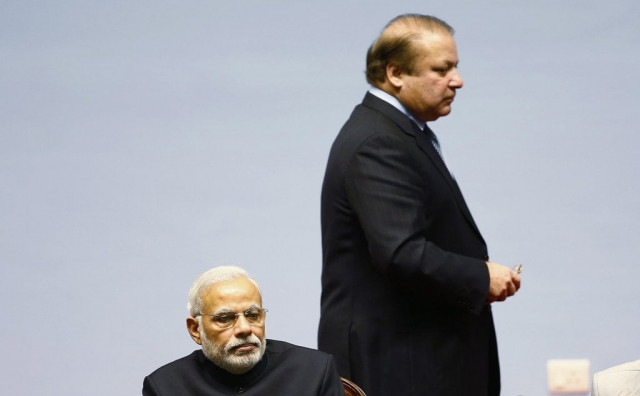India rules out talks on Pakistan’s terms
Indian Foreign Secretary S Jaishankar seeks talks on alleged cross-border terrorism in the disputed Himalayan valley

Prime Minister Nawaz Sharif walks past his Indian counterpart Modi during the opening session of the 18th SAARC Summit in Kathmandu. PHOTO: REUTERS
In a letter to Pakistani Foreign Secretary Aizaz Chaudhry calling for talks on Kashmir, Indian Foreign Secretary S Jaishankar has instead sought talks on alleged cross-border terrorism in the disputed Himalayan valley.
The letter apparently reiterates New Delhi’s response to an earlier letter, stating its willingness to engage in foreign secretary-level talks but not on issues chosen by Pakistan.
India refuses to attend Saarc conference in Pakistan
On August 19, Foreign Secretary Aizaz Chaudhry invited his Indian counterpart S Jaishankar to visit Islamabad by the month-end for talks focusing exclusively on finding a solution for Kashmir.
The proposal first came from Pakistan on August 15 when the foreign secretary wrote a letter to his Indian counterpart in the wake of the ongoing unrest in the disputed Himalayan valley.
Two days later, India responded to Islamabad’s proposal expressing willingness for talks if the agenda was ‘cross-border terrorism’ in Indian Kashmir.
The two sides have stuck to their respective positions and as a result the latest Pakistan proposal could also not break the ice.
At the weekly news briefing on Thursday, Foreign Office spokesperson Nafees Zakaria said India would always hide behind ‘excuses’ not to hold the dialogue. “We believe that dialogue is the best way forward and we, as a responsible country, want to resolve all issues peacefully through a meaningful, sustainable and result oriented dialogue,” he said.
Pakistani students miss science camp in India due to stringent visa rules
When his attention was drawn towards the Indian External Affairs Ministry’s statement that Pakistan and India agreed to resolve the Kashmir issue bilaterally under Simla Agreement, the FO spokesperson said Islamabad had consistently tried to find the solution to the Kashmir dispute in bilateral talks with India. “However, our efforts in the last four decades have not met with success due to the Indian intransigence,” he added.
“We are also aware that time and again whenever there would be a commitment from both sides to resolve a problem, and this would respond to both the questions, something would happen and despite the assurances that the dialogue should be continued irrespective of any external factors, India would hide behind excuses not to hold the dialogue.”
On Indian Prime Minister Narendra Modi’s references to Balochistan in his statement, Zakaria said this was a clumsy attempt by India to divert the world’s attention from the atrocities in Kashmir.“The international community must see through these desperate attempts by India to externalise a genuine, home-grown, indigenous uprising against the repression unleashed by Indian occupation forces in Indian-occupied Kashmir,” he said.
Military reimbursements
Islamabad has also conveyed concerns to the United States for its decision not to pay Pakistan $300 million in military reimbursements for failing to take indiscriminate action against all terrorist groups.
Beijing updated on Indian atrocities in Kashmir
Senior American officials held talks with Pakistani officials in Islamabad, where Foreign Secretary Aizaz Chaudhry contested Washington’s assessment with Dr Peter Lavoy, the special assistant to the US president and the US National Security Council’s South Asia director.
A FO statement said Aizaz highlighted the successes of Pakistan in dismantling and eliminating terrorist hideouts in tribal areas through Operation Zarb-e-Azb.
He lamented that despite Pakistan’s indiscriminate action against all terrorist groups, including the Haqqani Network, the US administration had decided not to certify the concerted and forceful measures taken by Pakistan.
The foreign secretary also reiterated Islamabad’s resolve not to allow anyone to use Pakistan’s soil against any country. He stressed that continued engagement was important to resolve the differences of perception and understanding.
Dr Lavoy noted the US administration recognised the efforts of the Pakistani nation and its armed forces in the fight against terrorism and appreciated Pakistan’s outreach to Kabul and efforts aimed at securing peace and stability in Afghanistan.
He added that given the imperatives of peace, stability and security in the region, continued close cooperation between Pakistan and the US was very important to successfully fight terrorism and to attain the objectives shared by both countries.
Later, Lavoy also joined Richard Olson and General John Nicholson in a meeting with army chief General Raheel Sharif at the GHQ to discuss regional security issues and matters of mutual interest, including a border management mechanism along Pak-Afghanistan border.
Future of MQM
On Altaf Hussain’s latest controversial statements, the FO spokesperson at his weekly briefing said the matter was already taken up with the British government, as confirmed by the interior minister a day earlier.
“Between some countries the ministries or authorities concerned establish cooperative mechanisms for direct dealing,” he said, claiming that Islamabad has a similar arrangement with the British home ministry for interaction on immigration- and security-related matters.
Published in The Express Tribune, August 26th, 2016.



















COMMENTS
Comments are moderated and generally will be posted if they are on-topic and not abusive.
For more information, please see our Comments FAQ